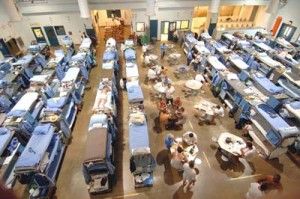CA legislation, lawsuits shake up immigration law
by James Poulos | May 3, 2015 5:00 am
 [1]A series of political and policy moves have dramatically unsettled immigration law in California, both at the state and federal level. Legislation developed in Sacramento, in the wake of President Obama’s executive actions shielding many from deportation, would grant expansive new rights to unlawful immigrants. But challenges to Washington’s deportation regime raised the specter of a massive overhaul of that system.
[1]A series of political and policy moves have dramatically unsettled immigration law in California, both at the state and federal level. Legislation developed in Sacramento, in the wake of President Obama’s executive actions shielding many from deportation, would grant expansive new rights to unlawful immigrants. But challenges to Washington’s deportation regime raised the specter of a massive overhaul of that system.
Challenging detention
Under the Obama administration, current policy has permitted the detention of mothers and children who claim they immigrated to escape violence in their country of origin; but as the Sacramento Bee reported[2], U.S. District Judge Dolly Gee in California has handed down a so-called tentative ruling that would invalidate the practice. Gee held that federal policy “violates parts of an 18-year-old court settlement regarding the detention of migrant children, according to memos that outline the tentative ruling.”
“The tentative court decision could have sweeping implications, forcing U.S. Immigration and Customs Enforcement to make some difficult choices: release undocumented women and children into the community; release the children but detain the mothers; or completely overhaul the way the agency shelters the migrants until their cases are heard by immigration courts.”
 [3]The potential overhaul came amidst growing criticism of federal detention policy in California. “Even as the number of immigrants caught illegally crossing the U.S.-Mexico border has fallen to the lowest levels since the 1970s,” the Los Angeles Times reported[4], “the federal government has increased spending on immigrant detention, filling 14,000 more beds last year than it did in 2006.” According to the Times, civil liberties and activist groups have complained that much of the expansion has involved contracting out detention to private firms. The country’s newest facility, in Bakersfield, came online with Geo Group, an independent prison company, handling operations.
[3]The potential overhaul came amidst growing criticism of federal detention policy in California. “Even as the number of immigrants caught illegally crossing the U.S.-Mexico border has fallen to the lowest levels since the 1970s,” the Los Angeles Times reported[4], “the federal government has increased spending on immigrant detention, filling 14,000 more beds last year than it did in 2006.” According to the Times, civil liberties and activist groups have complained that much of the expansion has involved contracting out detention to private firms. The country’s newest facility, in Bakersfield, came online with Geo Group, an independent prison company, handling operations.
Switching out workers
At the same time, federal immigration rules have come under fire in California from advocates for citizens themselves. One group of plaintiffs recently brought suit against the Department of Homeland Security over its new work permit policy. In addition to visas, the Daily Caller reported[5], DHS has decided to grant work permits to immigrants’ spouses — an estimated 100,000 of them, if all those eligible apply for the benefit.
“The complaint, filed by the Immigration Reform Law Institute on behalf of the displaced workers, alleges DHS does not have the authority to make the rule, and that the rule violates federal labor protection law. IRLI is asking the judge to halt implementation of the rule until the case is heard.”
A statewide agenda
Despite the turbulent environment, state legislators have tried to build on the protections for unlawful immigrants included in president Obama’s recently implemented executive actions. Earlier this month, Sacramento Democrats unveiled a broad package of legislative proposals designed to provide an interlocking suite of benefits to California residents who immigrated unlawfully.
As the Orange County Register noted[6], if passed, the new laws would beef up penalties for abuse of the E-Verify system, increase protections against fraudulent immigration attorneys and bar businesses discrimination over immigration status, citizenship or language. What’s more, the legislation would extend Medi-Cal coverage to all Californians, regardless of their legal standing as immigrants.
In an effort to build some internal management of the new proposed measures into California law, state Democrats also pushed to include an “Office of New Americans” within the governor’s office, tasked to smooth the regulatory and social road for beneficiaries.
California’s extension of drivers license privileges to unlawful immigrants was worked out in close consultation with regulators in Washington. But critics warned that the new measures threatened to conflict with known federal law. At the Daily Beast, Reuben Navarette observed[7] that the Immigration Reform and Control Act, passed in 1986, “made it a federal crime to knowingly hire an illegal immigrant. Now California wants to make it a state crime to not hire one? Employers can now pick their poison: They can violate one law or the other.”
Meanwhile, Navarette noted, the Medi-Cal proposal lacks a source of funding, despite likely costs in excess of $1 billion.
- [Image]: https://calwatchdog.com/wp-content/uploads/2014/06/Immigration-children-beeler-cagle-June-30-2014.jpg
- reported: http://Read%20more%20here:%20http://www.sacbee.com/news/politics-government/article19835067.html
- [Image]: https://calwatchdog.com/wp-content/uploads/2013/07/prison-california-department-of-corrections-photo.jpg
- reported: http://www.latimes.com/local/california/la-me-immigrant-detention-20150424-story.html
- reported: http://dailycaller.com/2015/04/24/displaced-american-workers-sue-dhs-over-work-permit-expansion/
- noted: http://www.ocregister.com/articles/california-657119-law-immigrants.html
- observed: http://www.thedailybeast.com/articles/2015/04/21/how-california-s-democrats-are-screwing-immigrants.html?source=socialflow&via=twitter_page&account=thedailybeast&medium=twitter
Source URL: https://calwatchdog.com/2015/05/03/ca-legislation-lawsuits-shake-immigration-law/